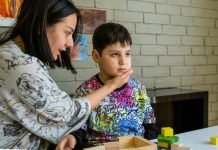
In a new study, researchers found genome testing for siblings of kids with autism may detect autism before symptoms appear.
The research was conducted by a team at the University of Alberta and elsewhere.
One of the key priorities of interventions for autism is starting early, with some evidence showing infants as young as seven months old could benefit.
Yet, most children in North America aren’t diagnosed with autism until they’re over four years of age.
In the study, the team found testing the DNA of siblings of children with autism may be predictive of a future diagnosis even if symptoms aren’t yet apparent.
Autism refers to a group of neurodevelopmental conditions resulting in challenges related to communication, social understanding and behavior.
Studies show families who have a child with autism have a 6.9 to 19.5% chance of another child having autism and a 30 to 40% chance of another child having atypical development.
Genetic factors are the most likely reason scientists see a clustering of autism-related traits in families.
The team wanted to know the possible benefits of genetic testing for infants whose older siblings had already been diagnosed with autism.
The researchers looked for the presence of genetic alterations that have been linked to autism called copy number variations (CNVs) in over 288 infant siblings from 253 families.
By age 3, 157 siblings were either diagnosed with autism or developing atypically. DNA testing revealed CNVs in genes relevant to autism in 7% of the 157 siblings who were eventually diagnosed.
The study found that the presence of an autism-relevant CNV in a sibling had a high likelihood of predicting a future diagnosis of autism or atypical development.
This marks the first time that scientists have been able to quantify the predictive value of CNVs in determining these diagnoses.
These findings add to a growing body of evidence that biomarkers might be helpful in identifying pre-symptomatic infants who are likely to develop autism or other developmental challenges.
The team says it is important to closely monitor their development and start treatments early to support their skill development and address emerging functional impairments related to autism.
One author of the study is Dr. Stephen Scherer, Senior Scientist.
The study is published in Nature Communications.
Copyright © 2019 Knowridge Science Report. All rights reserved.



